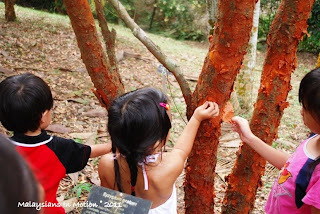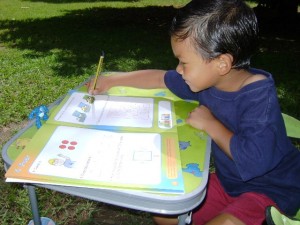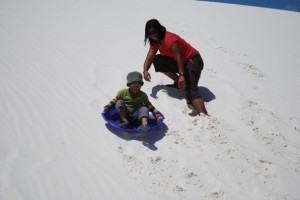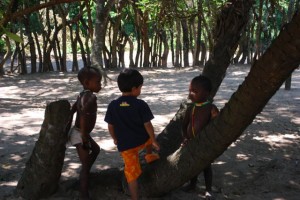When life changed for Ghani, Adrian and I
This article was written for and first published in Loyarburok on 5 December 2011, and was subsequently published in the Selangor Times ( with different images) on 9 December 2011:
Life has always been good. Well, pretty good anyway, all things considered.
We lived a comfortable life, had a decent roof over our heads and enjoyed holidays locally and abroad. In many ways, we were typical Malaysians with the attitude that said – I am okay, so what the heck?
My first encounter with the Orang Asli of Malaysia was back in 1994, when my late husband and I joined a group of friends for a weekend trip to Tasek Chini in Pahang. It was a very touristy introduction and we never really gave a second thought about our indigenous brothers and sisters until 16 years later.
We left home when Ghani decided to study law as a mature student in 2000. After living abroad for 8 years, we decided to give up the rat race and return to Malaysia. We took 2 years off to track our way home via the scenic route on land in our trusty 4×4.
In 2008, we left London when our son, Adrian, was 3 years old and arrived in Malaysia just in time to celebrate his 5th birthday. We had travelled through 46 countries on 4 continents.
During our travels, we made a point to experience as much of the local lifestyle as possible, especially in Africa. For 5 months, we camped where possible in tribal villages, often welcomed into the homes and hearts of total strangers. We were offered food by families who could barely afford to feed themselves and shown such warm hospitality that I can’t even begin to describe how humbled and grateful we felt.
Upon our return to Malaysia, we settled back into a non-nomadic lifestyle with some difficulties. Not only did we have to integrate ourselves back into a society we had been away from for 10 years, we also had to deal with certain health issues faced by Ghani. We realised that our travels had totally changed our mindset and outlook of life.
Our involvement with the Orang Asli communities began in early August 20110, when Ghani saw an Al Jazeera report on television, entitled “Malaysia ethnic tribes ‘forced to convert’”, one evening. I was in the kitchen when Ghani called for me to come to the living room and watch the feature. He was gob smacked by what he saw and heard on the television. There we were, looking at villages in Malaysia, somewhat similar to those we saw in Africa. Surely this was not happening in Malaysia, and surely the report was not true?
The only way to know the truth, Ghani thought, was to find out for ourselves.
We lived just 15 minutes down the road from the Temuan Orang Asli Village in Sungai Buloh. One Sunday morning, we took a drive out to the village and spent the morning chatting with the villagers. This gave us a much deeper insight of some of the issues faced by the Orang Asli not just in the rural interiors, but also the urban fringe villages that are within close proximity to the city. They live without electricity, basic amenities and still depend on gravity-fed water supply.

Pus oozing from a 2-year old toddler's infected ear
We also found that in this particular village, healthcare services were poor despite being so close to the Sungai Buloh Hospital. The local government-run clinic did not seem to take their ailments seriously. A 2-year old toddler, with pus oozing out of his ear, had been given only eardrops for the past 4 months. Eardrops alone would not have helped to clear the infection as one would first need to clean the wound before applying it; something even we, who are not medically trained, knew.
It was our fateful encounter with Kedang Pil, brother of the village matriarch, that gave us the drive to do what we can for the Orang Asli communities.
Kedang had spent the past few months in and out of the local Klinik Desa, with complaints of prolonged cough, fever, chills and lethargy. Each time he visited the clinic, he was prescribed Paracetamol, cough mixtures and pain killers. He was told to go home and rest.
One morning I got a call from Kedang’s niece saying that her uncle had collapsed and was admitted to the Sungai Buloh Hospital. He was placed in an isolation unit and his family did not know what was happening to him. Ghani and I rushed over and were informed that Kedang had been diagnosed with tuberculosis (TB), and that he was in very critical condition.

Kedang fighting to stay alive at Sungai Buloh Hospital's isolation ward
Kedang passed away two days later. Trying to get his body released for burial was a challenge. Kedang was a Malaysian. He was no different from me and yet, because he was an Orang Asli, a different set of rules applied. Both Ghani and I were left feeling perplexed.
The release of his body for burial was delayed, as we first needed clearance from the Jabatan Hal-Ehwal Orang Asli (Orang Asli Welfare Department) and was questioned repeatedly about his religion and which burial rites should apply.
This was followed by yet another challenge to get the other villagers tested for TB, as they had lived in close contact with Kedang. The children, some of whom were coughing themselves had been exposed to other children in the local schools.
Our frustrations were brought to the attention of Dato’ Ambiga Sreenevasan, the Chairperson of the Malaysian Bar Council’s Committee on Orang Asli Rights (COAR). She surprised me with a phone call one evening asking details of the issues faced by the village, especially in relation to their healthcare. She then brought this to the attention of Tan Sri Datuk Dr. Hj. Mohd Ismail Merican, the then Director-General of Health under the Ministry of Health.
This marked the beginning of Ghani, Adrian, and my active involvement in working with different Orang Asli communities. We served as observer members of COAR and co-founded a community support group with some members of COAR and leaders of the Orang Asli network.

Arts and craft session with pre-schoolers in Kampung Peta
The support group seeks to provide school supplies, guidance and support to several community-run pre-schools in Orang Asli villages. The pre-schools are set up and facilitated by the Orang Asli themselves. The aim is to give each child an opportunity for literacy and not to be at a disadvantaged position once they start their formal education in government-run schools.

Teaching Orang Asli children how to make bean shakers out of empty plastic bottles
Since Ghani’s passing in March this year; Adrian, our now 7 year-old son, and I have carried on with our volunteering work with the Orang Asli Learning Centres Community Project, COAR and other initiatives involving Orang Asli communities. All these are carried out on a pro bono basis, something we have always been grateful for. We have been blessed in life, and this is just a small way for us to give back to society.

Working with Orang Asli communities at grass roots level in Kuala Koh
Volunteering our time and energy has benefitted us greatly. Very often, we find that we receive much more than we’ve given. We have much to learn from our indigenous brothers and sisters, even simple life’s lessons on humanity, humility and the grace of giving when you do not have enough for yourself.

Adrian feeling very much at home with the Orang Asli children
Many have asked how I’ve managed to drag my 7-year old along on field trips to the interior villages, sometimes up to 3 to 4 days, with no proper water supply, electricity, sanitary facilities, access to medical amenities and often without substantial food. Well, we manage. You learn to live without the mod-cons we have in our everyday life; and more importantly, we learn to appreciate what we do have, knowing how fortunate we are to have them when others at our doorsteps are living without.

The world has always been a classroom for Adrian
Adrian spent two of his most formative years living a nomadic life, travelling overland through different countries, experiencing different cultures with different traditions and belief systems. He adapts as all children will, when given the opportunity to experience different environments. He plays with the local kids, and they look out for him. He joins in their traditional celebrations, and can Sewang as well as any Orang Asli can.
As a mother, I cannot be more thankful for the experience Adrian gets from our work and the wealth of knowledge shared with him by other volunteers, field workers and local villagers we work with. The world has always been his classroom and it continues to be so.
There is still so much to be done. There are still so many wrongs to be corrected and so many issues to be addressed – from land rights to just basic human rights. From creating awareness amongst the communities, advising them on their rights as Malaysian citizens, to walking with them in their efforts to preserve their unique identity, culture and traditions.
As volunteer field workers, we work with the grassroots communities, doing what we can in our own small little way. One thing is for sure though, no matter how small a part anyone plays, it is never insignificant.
You don’t have to engage in grand, heroic actions to participate in the process of change. Small acts, when multiplied by many people, can transform the world
– Howard Zinn
Alison Murugesu-Ghani is a hotelier by profession. She gave up her corporate life in London to spend two years travelling overland with her late husband and their young son in 2008-2009, taking the scenic route back to their homeland through 46 countries in 4 continents. She is currently living a non-nomadic life in Kuala Lumpur.
Posted on 5 December 2011.










































